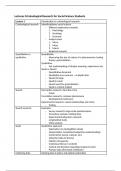Lectures Criminological Research for Social Science Students
Lecture 1 Introduction to criminological research
Criminological research Interdisciplinary social science
- Different explanatory models:
1. Psychology
2. Sociology
3. Economy
- Analysis level
1. Micro
2. Meso
3. Macro
- Empirical research
Quantitative vs Quantitative
qualitative - Measuring the size of nature of a phenomenon; testing
theory; generalization
Qualitative
- Get understanding of deeper meaning, experiences etc
Quali vs Quanti
- Quantitative dominant
- Qualitative less common – in-depth data
- Quanti N=large
- Quali N=small
- Quanti used for generalization
- Quali is content-related
Quanti Descriptive research, describe crime
- Scope
Correlation research; compare phenomena
- Development/coherence
Experimental research, causal relationships and crime
- Testing
Quanti research Examples
- Survey research; large-scale questionnaires
- Secondary analysis; existing data
- Experimental laboratory research
- Longitudinal study
- Meta-analysis
Quali Qualitative approach
- Explorative (no testing)(Dive deep)
- Interpretative (verstehen)(subjective understanding)
- Constructive (social, cultural, etc.)
- Inductive (data to theory)
- Holistic (all aspects)
- Contextual (focus in context)
- Cyclical and iterative (repeating empirical cycle)
- Primary data (first-hand, fieldwork)
Collecting data Existing data at police and judicial authorities
, - Illegal activity
- Police reports
- Criminal cases
Non-judicial data
- CBS
- Crime and law enforcement (WODC & CBS)
- United Nations: UNSTATS & UNODC
Victim or offender surveys
! there are inaccurate stats bcs of dark stats (a lot not reported) !
Dark number - Fraction of illegal activities actually recorded and
reported
Non-response - High non-response in criminological research
- People refuse to answer bcs is about crime
Empirical cycle 1. Observation
2. Induction
- Formulate abstract research question
- Guiding cause and measurable effect
- From specific to generalization/theory
- Propositions and concepts
3. Deduction
- Specify general theory
- Develop workable hypothesis
- From general/theory to particular
- Operationalize
4. Testing
- Conducting research
- Collect data
- Analysing/testing
5. Evaluation
- Confirm or reject hypothesis/theory
- Sufficient evidence?
- Theory can be: adjust, expand, improve
Why focus on - Experiments difficult or impossible
qualitative methods in - Official statistics limited (dark number) and politically
criminology loaded (crime numbers = hot issues)
- Survey data on sensitive topics: gap between attitudes
(speech) and social practices (deeds)
- Unrecorded fields such as organised, corporate, state
and white-collar crime. Also group or gender violence,
fraud, drugs, etc.
Qualitative research - Cross-sectional or snapshot (one moment)
designs (in criminology) - Comparative (also meta-level and parallel studies)
- Longitudinal (more measurements, development)
- Retrospective (biography, life history, perceptions before
and after intervention, historical)
- Case study (n=1)
- Ethnographic (small groups, thick descriptions,
, verstehen)
Practical cycle of 1. Problem statement, research question
qualitative research 2. Determine location/situation/case
3. Determine method, respondent/group selection
“sampling”
4. Acquire access, ask permission
5. Collect, record, retain data
6. Data analysis
7. Report
! from data analysis, you can go back to 1, 2, 3 !
! from acquiring access, you can go back to 2: determining
location !
Research question - Literature search / information first!
- Investigable (empirical – ethical)
- Feasibility (time – money – response / access)
- Simple and clear
- Relevant (scientific, social, policy) and original
- Balance between focused and broad
- What, who, where, when, how and why
- No YES-NO questions, better open questions
- Careful with why questions (factors? Motives?)
Data collection - Interviews
methods - Participant observation in situations/locations withing
groups, networks, organizations, etc.
- Discourse analysis (text, image, sound, art, film)
- Content analysis
- Every above method can happen online
Seminar 1
Illegal markets of goods and services
Deadlines - 9th June 17.00 research assignment
- Seminar 2, 17.00 zondag mail naar Romee and other
subgroup: a4, research proposal: student names +
number, intro(context), relevance, RQ, methods, min. 5
literature references, who, how, when, where
RQ Open
Relevant
Original
Broad, not too broad
Demarcated, concrete: What when where
Defined in 1 way
Feasible, doable
Explanatory questions, not descriptive
Lecture 2 Open interview





